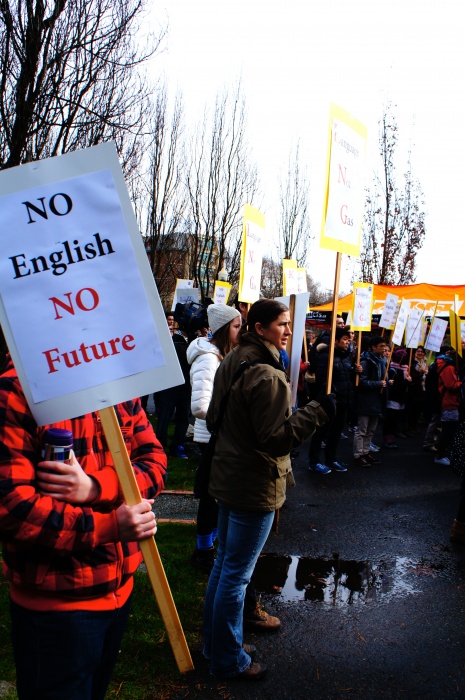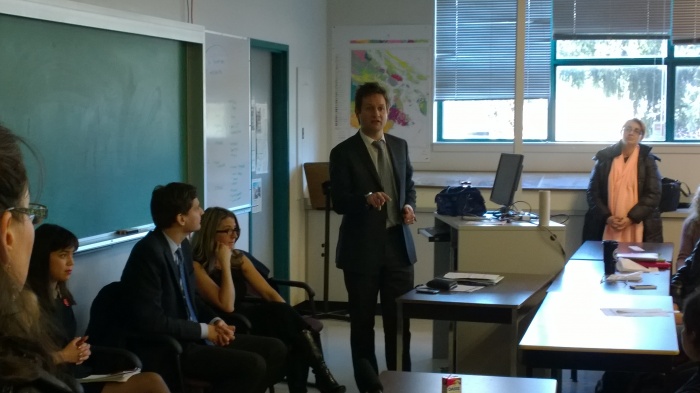Camosun College will be receiving $1.43 million in one-time transition funding for ESL training, the provincial government announced on Wednesday, February 19. The funding, part of a transition plan the Ministry of Advanced Education has developed with the federal government and public postsecondary institutions, comes after the news of funding cuts for domestic ESL students (see nexusnewspaper.com for last issue’s story about the ESL cuts). The money, which is part of funding going to 17 postsecondary institutions across BC, will fund the college’s ESL training through the next year.

“That is very important for us strategically, and is very very important for us in terms of determining the future of ESL,” says Camosun vice-president of communications Joan Yates. “So we feel that the provincial government has come through in terms of transition money that is very much needed and appreciated right now.”
Yates says that the college is currently “putting in place a number of scenarios” in regards to what will happen after this one-time funding money runs out; until then, she says that this transition funding is a positive thing.
“It’s good news, it’s positive news, it allows for the appropriate planning, it allows for some level of proactivity as opposed to being reactive to it, and gives us some time to see what options are available,” she says.
CCSS external executive Simka Marshall says that while it’s good to get some funding to help the current students finish off this year of their ESL training, she stresses that it is still just one-time funding and might be taking away from the larger issues at hand.
“With this transitional funding, it’s good, but it’s created a lot of distraction and the attack on ESL and postsecondary education is still happening,” says Marshall. “There’s still an issue here: we still have to fight for the reversal of this cut.”
The CCSS recently held two events to help students better understand and voice their concerns about the recent cuts to Camosun’s ESL program.
On Thursday, February 20, they held a “town hall” meeting at the Interurban campus. Over 100 people, including students, community members, and Camosun faculty, attended the standing-room-only event, according to Marshall.
“It was a lot more successful than we anticipated,” says Marshall, who explains the event was a forum for the students to share their stories and ask any questions they had.
The CCSS invited local MLAs Lana Popham and Rob Fleming and advanced education opposition critic and New Democrat MLA David Eby to the event, all of whom showed up. They also invited minister of advanced education Amrik Virk and Premier Christy Clark; Clark sent her regrets to the CCSS, explaining she couldn’t attend because she was travelling that day. Virk did not reply to the invitation.
“That was a nice gesture to see that we actually got a response,” says Marshall. “The minister never responded, so that was disappointing.”
(A spokesperson for the minister of advanced education told Nexus that they can find no record of this invitation being sent.)
So many students wanted to talk at the meeting that the event had to stop before everyone had a chance to say what they wanted to.
“There was a lot of talk about wanting to follow the Canadian dream and getting here and finding out this program is discontinued, and how heartbreaking it is,” says Marshall. “So it was really emotional, and a lot of anger as well.”
Students spoke for 40 minutes and the politicians had five minutes to respond to the students’ concerns. They all said they’d take their stories back to the Legislature. “It was incredibly successful,” says Marshall. “It was a very powerful event.”

The next day, Friday, February 21, the CCSS held a rally outside the Ministry of Advanced Education office at 835 Humboldt Street. Around 150 people showed up, including a lot of the same ESL students from Thursday, but this time they brought their families, says Marshall.
“That was a really powerful message, to show how this program really affects these students’ lives, and they depend on it to enter the workforce and get a job so they can support their families,” she says. “Also, a lot of people are really worried about what the future is going to be of ESL, and that’s something that was expressed, like, ‘What’s going to happen to my children when they’re growing up and need this training?’”
As well, some Camosun students and CCSS members held a sit-in in the lobby of the Ministry of Advanced Education office at 8:30 that morning to draw more attention to the situation. “They just wanted to take some direct action to show how serious this is,” says Marshall, who adds that the CCSS will be organizing more events like this in the months ahead.

It seems like there is not much attention being paid to the Federal governments role in creating this policy. They have chosen to move millions of dollars from public institutions that have democratic checks and balances (like, appeal procedures, unions, ombudsperson, elections, and an autonomous student press) to non-profit societies that will have little to none of these things.
Thank you for covering this Nexus. Decisions like this is how our world is getting a little less fair and more mean.